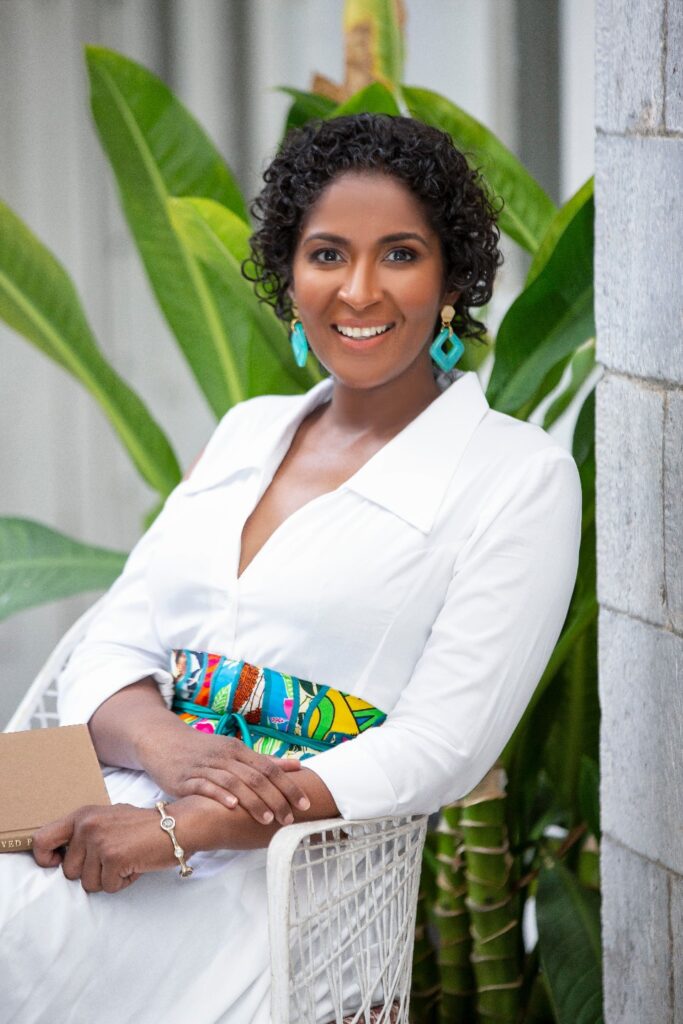First-time novelist claims top Bocas prize

It may shock you that, once upon a time, Celeste Mohammed would not claim the title of writer.
It took time and work to change Mohammed’s outlook.
The lawyer-turned-author of the award-winning novel Pleasantview spoke with the Express recently about the journey to publishing her first novel.
Pleasantview won the Caribbean Readers Award for Fiction earlier this year and it has just won the 2022 OCM Bocas Prize for Caribbean Literature of US$10,000, but Mohammed isn’t sure her mind has fully processed the win yet. It took four years for a publisher to finally accept Pleasantview. By that time, Mohammed had endured more than 30 rejections.
Mohammed said all the novel needed was a chance and she banked on Caribbean readers to give it that chance.
The novel features nine discrete short stories, most of which have been individually published in literary magazines. The stories centre on a fictional Trinidadian town called Pleasantview.
Written in a combination of English and Trinidad Creole, Pleasantview, Mohammed said, attempts to dispel the one-dimensional myths of what it’s like to live in the Caribbean. “We can’t expect the world to take us seriously if we don’t take ourselves seriously and engage in serious self-analysis and discussion. Our literature is a way to do just that.
“The stories centre on a fictional Trinidadian town called Pleasantview which was modelled on a real town. I used the town as a fishbowl to take a hard look at many of the challenges facing contemporary Trinidad society. Racism, intimate partner violence, religious fanaticism, immigration and emigration, the phenomenon of missing fathers,” Mohammed explained.
Most of the stories in Pleasantview are written, Mohammed noted, either partially or entirely, in a male voice and perspective. “As a woman, I have been conditioned to be suspicious of the Trinidadian male psyche, and to judge the Trini male solely by his actions; but I wanted to force myself to be compassionate or at least curious, instead. I wanted to explore what motivations, hurts, traumas, pathologies might drive a male to act in a certain destructive way. I think it’s a question we need to ask on a societal level, as well: why are our males engaging in such wanton destruction of themselves, their families and those closest to them?” Mohammed said.
Mohammed said the road to success hadn’t been an easy one.
“I had endured more than 30 rejections. But I always believed that Caribbean people would embrace this book. All it needed was a chance. Getting Pleasantview published was a bumpy, pot-holed road. There were many rejections, because there were many reasons to reject the work: the writer is unknown, the writer doesn’t live in the USA or UK, the work utilises too much patois, the work is too literary and not commercial enough, the themes are too controversial, the work doesn’t fit into established norms of what a Caribbean novel should be…sun, sea, sand, romance and party.”
Pioneering efforts
She said Trinidadian literature has long had a home in the wider world, particularly the UK, due to the pioneering efforts of many, including CLR James, Selvon, Naipaul, Lamming, Walcott et cetera.
“In modern times, we’ve seen other UK-based Trinidadian writers, Ingrid Persaud, Claire Adam, Monique Roffey and others achieve success on the international stage. But I struggle to name one locally based Trinidadian writer who has achieved the same level of recognition.”
“This is a matter of grave concern. Half a century ago, Lamming complained that it was necessary for a writer to leave the region in order to gain any appreciable success. Why should that still be the case? The writer who is seated here, in the belly of the beast, who must negotiate the daily exigencies of life in the trenches, is the writer who enjoys the best vantage point to take the pulse of society and report on its health. The writer who is seated here has a responsibility to do so truthfully, and to speak about the concerns of the people on the ground. I take that responsibility seriously even if it is risky business. What else are you working on? I am working on a second collection of short stories This time, focused on a particular family, through several generations. I can’t say much more than that,” Mohammed said.
The lawyer-turned-author was never passionate about law as she is about writing. She asserts that her training as a lawyer has given her an advantage as a writer. She was always passionate about justice, and about the power of words to advance justice for the underdogs and the marginalised.
“I want to believe I have found, in creative writing, a more satisfying mode of pursuing that passion. In my opinion, the study of Law imparts a particular method of rational thinking and an ability to self-isolate to take oneself out of the equation, in order to advocate for another person.”
“Those skills have served me well in my writing career, as they have allowed me to create characters who are believable and life-like even though they do not resemble me in any way. Sometimes, I don’t even like my characters, but I can set aside my feelings and advocate their point of view,” She said.
It took some time for Mohammed to process the win.
Advice for aspiring writers
“I was happy and honoured to be longlisted, but when they told me I had won the Fiction category I was completely blown away. I remember staggering into the office, where my husband was seated, and being unable to speak. He asked what was wrong and I just burst out crying. I mean, real ugly crying and he had to put me to sit down until I could collect myself enough to say the words.
“On the night of the announcement of the overall winner, my daughter was ill, so I was busy attending to her and unable to watch the show. I returned to my phone to find so many congratulations, texts messages and missed calls,” Mohammed said.
Mohammed is working on a second collection of short stories. This time, focused on a particular family, through several generations.
“I can’t say much more than that,” Mohammed said, leaving this advice to young authors.
“My writing improved exponentially the day I got comfortable with criticism. So, I always advise aspiring authors to grow a thicker skin or some kind of exoskeleton. Find a writing mentor and humble yourself before them, invite them to critique your work as harshly as they dare, receive their feedback without getting defensive, sit with the pain, let it teach you new things about yourself and your work. Put those new insights into practice.”
